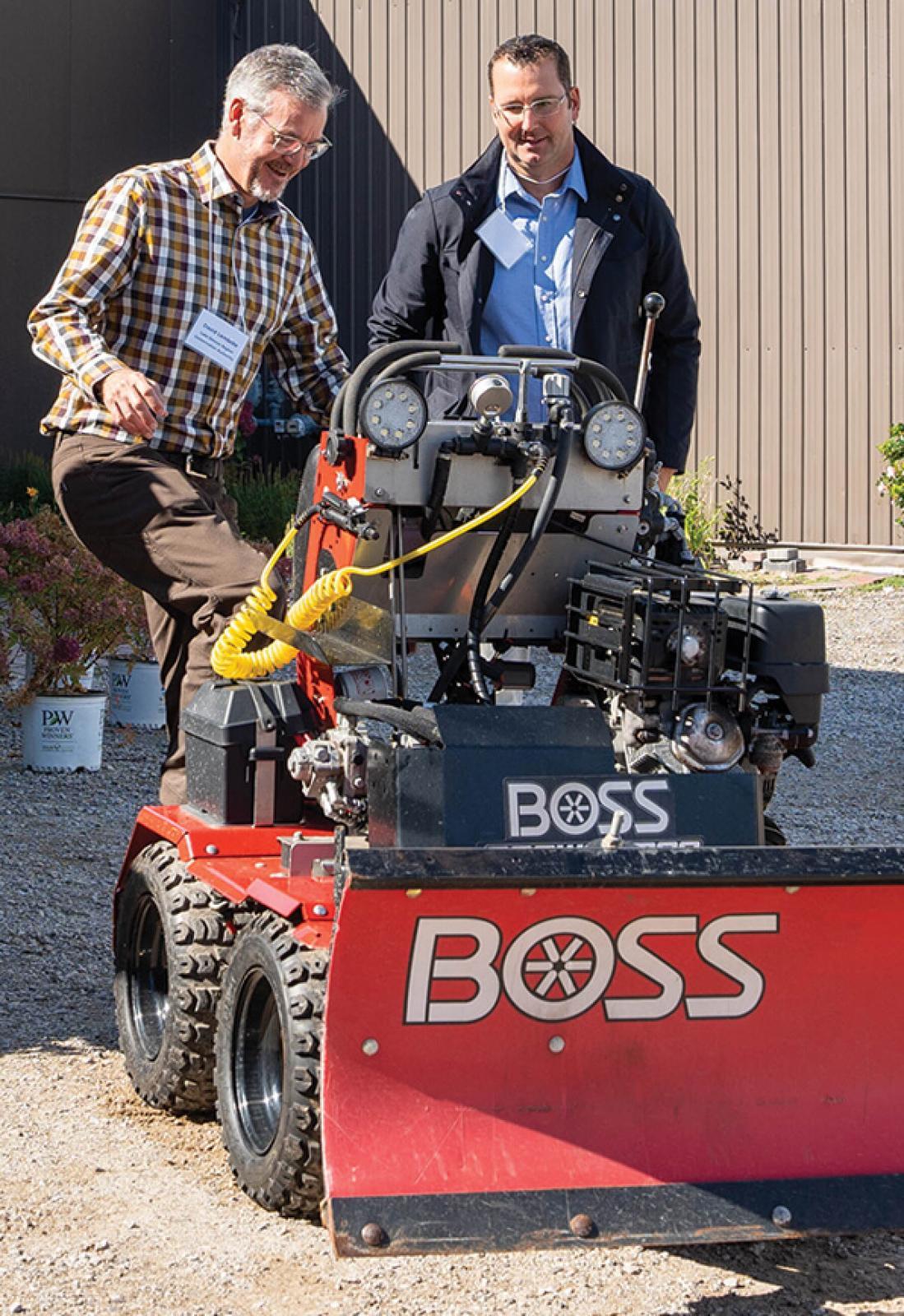November 3, 2023
Forum discusses alternate solutions to road salt

Jon Agg (right) brought a sidewalk de-icing machine for attendees to test drive.
The Lake Simcoe Region Conservation Authority organized the salt management conference in partnership with LO. The assembled leaders and stakeholders engaged in constructive dialogue on the use of winter salt, with the goal of a win-win-win solution for public safety, business owners and the environment.
“[We created] this forum to be the driving force behind positive change around the use of road salt. We know this is a huge challenge because the way forward has to balance environmental protection as well as public safety,” said Rob Baldwin of the Lake Simcoe Region Conservation Authority, who moderated the event. “Our goal is to share the knowledge and inspire action and collaboration on this important topic.”
Read on for some of the key takeaways for those who were unable to attend.
First, chloride from road salt is affecting Ontario’s water quality and the health of aquatic ecosystems, according to Ryan Sorichetti, Great Lakes scientist with the Ministry of Conservation and Parks.
The Ministry’s chloride monitoring systems found that chloride concentrations are highest and increasing in urbanized areas and in surface waters accessible by roads that are cleared with road salt. While most lakes, rivers and streams have chloride concentrations well below the Canadian Water Quality Guidelines (CWQG), some are exceeding them.
These areas are most deserving of provincial efforts to mitigate chloride’s harmful effects on aquatic organisms and their habitats, Sorichetti said. Generally, the science suggests snow and ice professionals ought to seriously curb their use of road salt.
Second, significant reductions in road salt usage are complicated by the ongoing liability crisis affecting the snow removal sector. Since contractors are individually liable for slip and fall accidents that occur on job sites, they are forced to over-salt roads, parking lots and sidewalks to avoid costly claims.
Poorly maintained or designed sites are part of the problem, added Jon Agg, owner of Pristine Property Maintenance. Snow and ice professionals sign contracts on sites despite significant safety concerns to keep themselves in business — carrying all liability risk for accidents they often can’t control.
Agg, Chris Morrison of Morrison Risk Services and Adjusting Services, and John Castelhano of BGIS, a facilities management company, all agreed the answer is government oversight. They urged the Province to establish an Authority Having Jurisdiction over the sector to regulate the use of salt and cost of insurance, mandate safer sites and training for contractors and property owners, and create balanced liability between the two parties.
Morrison added the cause is gaining momentum faster than ever, thanks to the advocacy work of Landscape Ontario and snow and ice professionals around the province. The new Minister of the Environment, Conservation and Parks Andrea Khanjin has committed to championing the cause.
Third, there are alternatives to road salt in some cases. Lorna Murison of Toronto Metropolitan University explained liquid anti-icing like salt brine or beet brine can be used to reduce the amount of chloride entering the water supply.
She said that though adopting liquid anti-icing may involve an increased cost for contractors up front, it can reduce costs down the line as road salt gets more expensive.
Fourth, contractors should consider getting Smart About Salt certified. Eric Hodgins of the Smart About Salt Council spoke about the training program, which aims to protect freshwater from road salt. It teaches contractors best management practices surrounding salt usage, like the importance of liquid anti-icing.
Getting Smart About Salt certified is voluntary, but some property owners seek contractors who have the certification. As an important first step to mitigating chloride concentrations in water sources, the program may become the foundation for future government-mandated training and standards.
Agg said landscape and horticulture professionals are front line climate change workers. They champion the environment over the summer but, unfortunately, a lot of this work is undone during the winter with excessive salt usage.
By sharing knowledge and inspiring action at events like the Salt Forum, snow and ice professionals can work together towards a more sustainable, safer and less salty future.